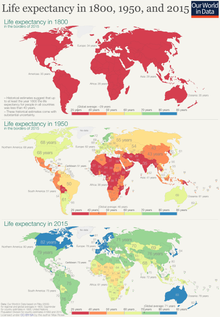Progress
Progress is the movement towards a refined, improved, or otherwise desired state.[1][2][3] In the context of progressivism, it refers to the proposition that advancements in technology, science, and social organization have resulted, and by extension will continue to result, in an improved human condition;[4] the latter may happen as a result of direct human action, as in social enterprise or through activism, or as a natural part of sociocultural evolution.
The concept of progress was introduced in the early-19th-century social theories, especially social evolution as described by Auguste Comte and Herbert Spencer. It was present in the Enlightenment's philosophies of history. As a goal, social progress has been advocated by varying realms of political ideologies with different theories on how it is to be achieved.
Specific indicators for measuring progress can range from economic data, technical innovations, change in the political or legal system, and questions bearing on individual life chances, such as life expectancy and risk of disease and disability.
GDP growth has become a key orientation for politics and is often taken as a key figure to evaluate a politician's performance. However, GDP has a number of flaws that make it a bad measure of progress, especially for developed countries. For example, environmental damage is not taken into account nor is the sustainability of economic activity. Wikiprogress has been set up to share information on evaluating societal progress. It aims to facilitate the exchange of ideas, initiatives and knowledge. HumanProgress.org is another online resource that seeks to compile data on different measures of societal progress.
Our World in Data is a scientific online publication, based at the University of Oxford, that studies how to make progress against large global problems such as poverty, disease, hunger, climate change, war, existential risks, and inequality.[5]The mission of Our World in Data is to present "research and data to make progress against the world’s largest problems".[6]
The Social Progress Index is a tool developed by the International Organization Imperative Social Progress, which measures the extent to which countries cover social and environmental needs of its citizenry. There are fifty-two indicators in three areas or dimensions: Basic Human Needs, and Foundations of Wellbeing and Opportunities which show the relative performance of nations.

.jpg/440px-American_Progress_(John_Gast_painting).jpg)